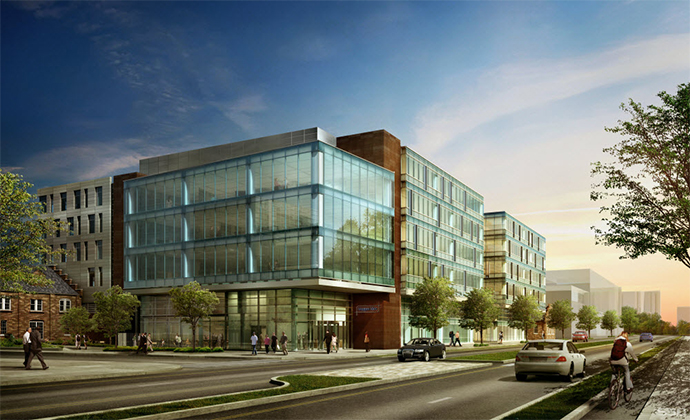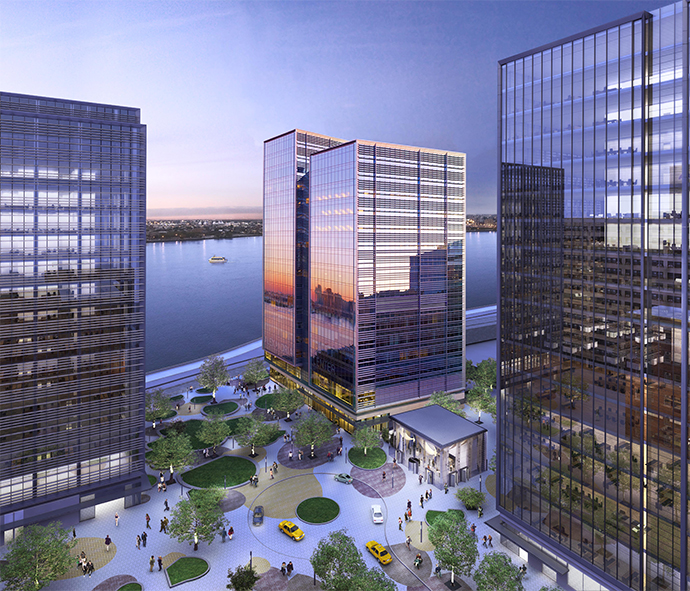One year ago, as reported in this space, Roche wound down a site search that considered 50 East Coast sites but chose only one. On Oct. 1, the firm will open the Roche Translational and Clinical Research Center at that chosen location: the new 419,000-sq.-ft. West Tower at the Alexandria Center for Life Science NYC located on 29th and 1st in Manhattan.
Roche, the building’s anchor tenant, will house between 200 and 300 employees in the new space, for which it signed an 11-year lease. Meanwhile the company is closing its 1,000-employee site in Nutley, N.J.
Joel Marcus, chairman, CEO and founder, of Alexandria Real Estate Equities, will be there. It’s just another event on the calendar for a 37-year industry veteran who last year was elected to the Board of the Foundation for the National Institutes of Health. Since founding Alexandria in 1994 as a garage startup with a business plan and $19 million of seed capital, he has led its growth into a publicly traded, investment-grade REIT with a total market capitalization of approximately $8 billion. He took time from a busy week and a busy year to talk to Site Selection.
“The reason we were able to win the day here in New York was they wanted to locate their translational clinical group out of Nutley into a market where they could do broad and deep collaborations,” he says of Roche, a firm with which Alexandria has longstanding ties. “We have the platform here in New York.”
Marcus was on the task force led by philanthropist and former Citigroup chairman Sanford “Sandy” Weill in 2001 that examined the factors needed to bring commercial life sciences into collaboration with the academic world. Alexandria competed and won a subsequent RFP, and built the New York location’s East Tower, which he says is now 103-percent occupied, complete with a large urban garden and conference center. Tenants include Eli Lilly and Co.; Pfizer Inc.’s Centers for Therapeutic Innovation; New York University’s Neuroscience Translational Research Institute; and Kadmon Corporation, LLC.
“We’ve seen a dramatic impact, even in a very short period of time, working in the Alexandria Center located right next to centers of academic and medical excellence,” says a testimonial from an unnamed Pfizer vice president of its Centers for Therapeutic Innovation program, which announced its lease with Alexandria in 2011. “We’re literally across the street from NYU. We can work with basic scientists and clinicians to rapidly advance new emerging science and translate that into patients.”
Crisis Precipitates Focus
Marcus says every time Mayor Michael Bloomberg speaks about diversifying the city’s economy from financial services, Alexandria’s bet on life sciences is part of the picture.
Key to Roche’s decision last year was a cluster of institutions in New York. Asked about the evolution of academia’s attitude toward industry collaboration, Marcus agrees they’re a good bit more proactive — perhaps out of necessity more than change of heart.
“Prior to the Lehman crisis, I think universities were a little more agnostic about teaming with developers. Some did, many didn’t — Harvard is a good example.”
Once some of those schools lost a third of their endowments, he says, they realized they might need to open their doors. But more important than the funding, he says, “the commercial companies are really the wave of the future. They’re the path to move discoveries from the bench to the bedside.”
Marcus says the nine major institutions in New York are “focused on collaboration amongst themselves. It’s pretty clear that New York has become one of the epicenters of collaboration.”
But New York City is just the latest nexus added to Alexandria’s network of thriving life sciences assets, including busy centers in Boston, San Diego and San Francisco, where Alexandria has worked with Genentech (now part of Roche) for 15 years. (Alexandria is a landlord to 13 of the 20 largest pharmaceutical companies in the world.)
Marcus says the area where his company drove development around the University of California San Francisco was just “a bunch of crappy old buildings and reclaimed environmentally contaminated land.” Now it’s a nexus of the university’s research campus, and makes for “an ideal clinical and commercial center — and that’s what we do.”
New Bets on the Future
“We’re working on some others,” he says, though it’s too early to name names.
But the names have been jumping to the fore in projects already announced this year.
Last week, UCSF announced it would establish a clinical and translational research unit focused on endocrinology at 499 Illinois Street in Mission Bay, a building where earlier this year molecular and personalized medicine service firm Illumina announced a long-term lease.
“The new San Francisco office will expand Illumina’s Bay Area footprint and increase visibility in a key customer and talent market,” said Illumina President and CEO Jay Flatley, whose company’s headquarters is located in another Alexandria development in San Diego. “This expanded presence will help us in our hiring and collaboration efforts, and support Illumina’s rapid growth as we pursue our mission to unlock the power of the genome and improve human health.”
The building has immediate access to the UCSF research campus and is one block away from three new hospitals — Benioff Children’s Hospital, Cancer Hospital and Women’s Specialty Hospital are scheduled to open in early 2015. UCSF is leasing 30,000 sq. ft. in a 15-year deal.
Alexandria has approximately 3 million RSF (including development and redevelopment assets) in the Mission Bay, South San Francisco, and West Peninsula submarkets. In addition to UCSF, Alexandria currently has approximately 30 client tenants in Mission Bay. One of them, digital health accelerator Rock Health, announced in June it would locate its global headquarters at 455 Mission Bay Boulevard South. “On the heels of UCSF’s May announcement of the creation of a Center for Digital Health Innovation,” said an Alexandria press release, “Rock Health’s decision reaffirms Mission Bay as the epicenter of the digital health revolution, which is poised to have a groundbreaking impact on the life science and healthcare industries by improving quality of care and lowering costs.”

Located in Kendall Square in Cambridge, Mass., the 11-acre Alexandria Center at Kendall Square will feature four ground-up first-in-class developments on Binney Street aggregating approximately 1.7 million RSF of high-quality laboratory/office space as well as approximately 200,000 RSF of residential space.
“Rock Health’s move to Mission Bay comes at a critical time as San Francisco implements national healthcare reform and is striving to give residents more choices for healthier lifestyles,” said San Francisco Mayor Ed Lee. “We are partnering with innovative companies such as Rock Health to disrupt the way we do business and, at the same time, improve the healthcare industry. Rock Health’s new proximity to UCSF doctors, entrepreneurs, and scientists at our small startups, pharmaceutical companies, and investors will accelerate advances in the life science, health care and technology industries here in San Francisco.”
Onyx Pharmaceuticals in March signed a 10-year lease with Alexandria for a new, single-tenant, ground-up development at 269 East Grand Avenue in South San Francisco.
Back East in Cambridge, Mass., earlier this month ARIAD Pharmaceuticals, Inc., a global oncology company, executed a lease amendment increasing its premises at 75/125 Binney Street by approximately 142,000 rentable sq. ft. (RSF). The lease amendment (after the initial announcement in January) brings ARIAD’s total leased premises to approximately 386,000 RSF, or 99.5 percent, of the project, with the rest slated for retail. Alexandria expects to deliver the 75/125 Binney Street facility to ARIAD in the first quarter of 2015.
In association with the amendment of ARIAD’s lease, Alexandria also announced the execution of a construction loan of approximately $250 million with a term of four years, with the right to extend it for an additional year.
Alexandria launched the overall Alexandria Center at Kendall Square campus in 2011 by announcing a build-to-suit for Biogen Idec, a project anticipated to be complete within a couple weeks.
Not all Alexandria plays have turned to gold. In February, the firm announced its affiliates had sold three clustered legacy assets aggregating approximately 300,000 RSF in the Worcester, Mass., submarket for approximately $40.3 million, with the intent of reinvesting the proceeds into higher-value central business district assets in Cambridge. According to published reports, the buyer was a group of subsidiaries of the University of Massachusetts Medical School, meaning some $1.5 million in property taxes for the city will now potentially vanish, given the university’s non-profit status. But the school, like Alexandria, aims to fill the space with for-profit life sciences tenants — even as the institution itself is one of the downsizers.
“The contractual expiration dates of in-place leases will likely increase vacancy to 48 percent in 2013 as major client tenants, including affiliates of University of Massachusetts Medical School and Quest Diagnostics Incorporated, relocate into larger, single-tenant facilities outside of the MBRP,” said Alexandria. “In evaluating the potential releasing strategy given current market dynamics, Alexandria believes that the assets would be best positioned for alternative uses.”
Those Worcester assets, purchased by Alexandria in 1999, were once visionary themselves: They were developed by the Worcester Business Development Corp. as part of Massachusetts Biotechnology Research Park, the country’s first purpose-built biotech park.
